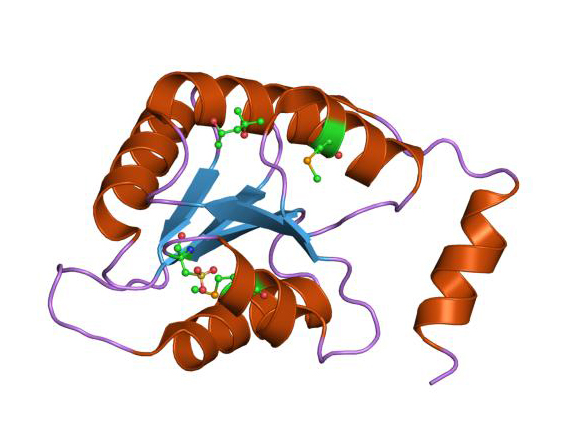
Chaperone Therapeutics, ALS Group Join In Research Pact
 |
|
Protein misfolding may be to blame for ALS. -- Photo: WikipediaCommons.com, http://www.ebi.ac.uk/ |
By Barry Teater, NCBiotech Writer
Chaperone Therapeutics of Research Triangle Park is teaming up with the nonprofit ALS Therapy Development Institute of Cambridge, Mass., to explore potential treatments for amyotrophic lateral sclerosis (ALS), a progressive neurodegenerative disease.
The research partners will complete preclinical optimization of Chaperone’s lead candidates and develop a clinical development plan in ALS.
Chaperone, a spinout of Duke University, has received $200,000 in financial support from the North Carolina Biotechnology Center – a $50,000 Company Inception Loan in 2008 and a $150,000 Small Business Research Loan in 2010. The company is developing frontline therapies to address protein misfolding and neuronal cell loss, the underlying causes of neurodegenerative diseases including ALS, Parkinson’s disease, Huntington’s disease, Alzheimer’s disease and others.
Chaperone has developed several promising small molecules targeting the activation of heat shock factor protein 1 (HSF1), a key modulator of pathways involved in protein folding and neuronal stress protection.
ALS origin believed tied to protein folding
“Like many neurodegenerative disease indications, ALS appears to be a protein misfolding disorder,” said Steve Perrin, Ph.D., CEO and CSO of the ALS Therapy Development Institute. “The accumulation of these errant proteins results in cellular stress in motor neurons, loss of innervation of skeletal muscle, and paralysis in ALS patients. We are excited about the partnership with Chaperone. These lead molecules could be first-in-class treatments for neurodegenerative diseases such as ALS.”
Preclinical work already underway at ALS Insitute
Preclinical experiments with Chaperone’s small molecules are under way at the Institute’s facility in Cambridge. The partners have designed cell-based assays to test the potential treatments’ ability to correct protein misfolding and protect neurons from stress-induced cell death, as well as in vivo studies to assess the treatments’ effect on the progression of ALS.
“Protein misfolding is the cause of many neurodegenerative diseases, and data from a number of disease models demonstrate efficacy through enhancing the cellular protein-folding capacity,” said Dennis Thiele, Ph.D., chief scientific officer and co-founder of Chaperone.
“We are delighted to work closely with the outstanding team at the ALS Therapy Development Institute to test our molecules that increase protein chaperone activity, as a potential disease-modifying therapy for ALS.”
The two research partners will provide more information as it becomes available or published through a peer-reviewed journal. They will hold a webinar about the research partnership on Aug. 18 at 2 p.m. Online registration is available here.
The ALS Therapy Development Institute is the world’s first and largest nonprofit biotech organization focused exclusively on discovering and development treatments for ALS. It shares data and information with academic and ALS research organizations, patients and their families.
